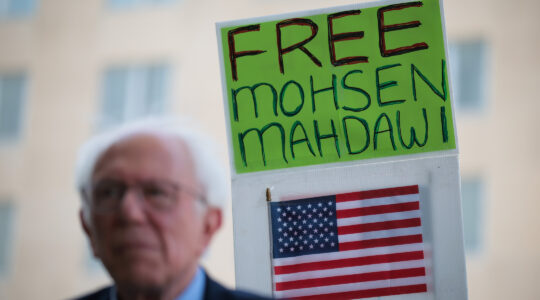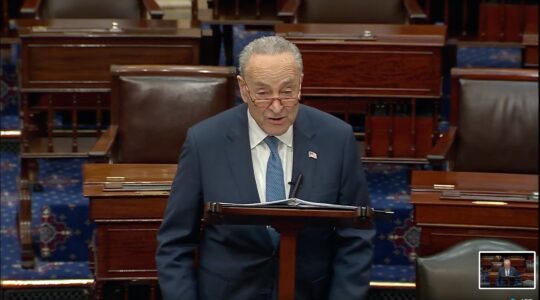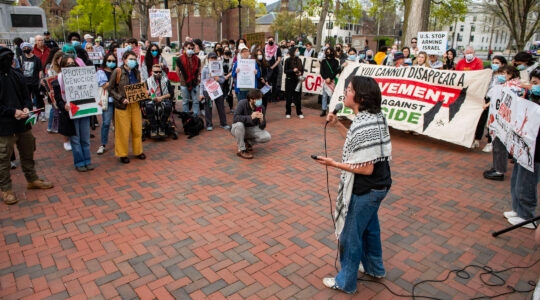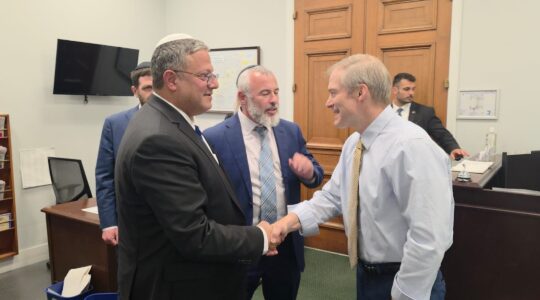NEW YORK (JTA) – With hundreds of world leaders, including Iranian President Mahmoud Ahmadinejad, slated to come here next week for the annual opening of the U.N. General Assembly, Jewish groups will be campaigning both privately and publicly against the Iranian regime.
The centerpiece of the public effort will be a mass protest rally Sept. 22 at Dag Hammarskjold Plaza, across from the United Nations.
Sarah Palin, the Republican vice-presidential nominee, is slated to be among the featured speakers, according to the Conference of Presidents of Major American Jewish Organizations, which is organizing the demonstration.
U.S. Sen. Hillary Rodham Clinton (D-N.Y.) had committed several weeks ago to speaking, but she canceled her planned appearance upon learning that Palin would be attending, according to news reports.
Meanwhile, behind closed doors, leaders of a handful of Jewish groups will take advantage of the opportunity to meet with presidents, prime ministers and top diplomats to press issues of concern to Jews.
“It’s an annual diplomatic marathon with leaders who descend on New York each year for the opening of the G.A.,” said David Harris, the executive director of the American Jewish Committee. “We have 60 to 70 private individual meetings scheduled. At each meeting, the Iran question is at the top of the agenda.”
The efforts come as chances dim for a fourth round of U.N. sanctions against Iran, given that Russia and China, both veto-wielding members of the Security Council, oppose new sanctions.
Jewish groups will be lobbying world leaders to enforce existing U.N. sanctions and take further steps against Iran wherever possible. They will urge countries to cut trade with the Islamic Republic, pass new laws against doing business with Iran and strengthen the coalition of nations actively trying to keep Iran from developing nuclear weapons.
The effort already is under way in Washington, where Jewish groups are lobbying Congress to close legal loopholes that allow U.S. businesses to conduct some trade with Iran.
Concomitant with the behind-the-scenes diplomacy, which is also conducted throughout the year, in part with visits by Jewish organizational leaders to capitals around the world, Jewish groups are going public, too.
They are trying to publicly shame oil companies that do business with Iran in a bid to cripple the oil trade that helps sustain the Tehran regime, highlight what Jewish groups say is Ahmadinejad’s genocidal threats, and educate the general public about Iranian-sponsored terrorism and the threat of a nuclear Iran.
The Anti-Defamation League has been waging a public campaign against oil companies with business in Iran by issuing a steady stream of news releases highlighting their activities. Among the companies are Shell and the Austrian energy giant OMV, which are planning to be part of a conference in Tehran in October to promote gas export opportunities with Iran. The Swiss government also is actively increasing its oil trade with Iran.
On the genocide issue, the Jerusalem Center for Public Affairs will host a half-day conference in Washington on Sept. 23 highlighting Tehran’s abysmal human rights record and the forecasts of Israel’s destruction by Ahmadinejad, who is scheduled to address the General Assembly that day.
Though attendance at the Washington event, “Conference on State-Sanctioned Incitement to Genocide: What Can Be Done?” will be limited to approximately 120 participants, organizers are hoping the invitation-only crowd of members of the U.S. Congress and their staffers, the media and Washington’s foreign diplomatic corps will help sway those in positions of power to join the coalition of nations actively opposing the Iranian leader’s genocidal incitement.
“The idea is that Ahmadinejad is in violation of the most important human rights convention, the genocide convention, and as a result should be treated accordingly,” said Dore Gold, the president of the Jerusalem Center for Public Affairs. “There has been a growing number of voices who accept this determination.”
That same argument will be made much more publicly a day earlier when thousands of people are expected to converge on midtown Manhattan for a rally to protest Iran’s policies. In addition to Palin, featured speakers are expected to include Israeli officials, Iranian dissidents, black ministers and Jewish leaders.
Organizers will be busing in demonstrators from as far away as Toronto and Montreal, and synagogue groups, schools and community groups all have been broadcasting the message to constituents to come out for the rally, which is scheduled to kick off at 11:45 a.m.
The Jewish Community Relations Council of New York is organizing the event in conjunction with the Presidents Conference, the United Jewish Communities federation umbrella organization, the Jewish Council for Public Affairs and UJA-Federation of New York.
Jewish groups held a similar demonstration last year during Ahmadinejad’s visit to New York for the 2007 General Assembly. During the visit he also spoke at a forum at Columbia University.
Ahmadinejad this year is expected to attend a Sept. 25 break-fast Ramadan dinner, known as an iftar, hosted by the American Friends Service Committee, a Quaker organization.
The Quaker group and the Grand Hyatt Hotel in New York City, where the iftar is to be held, did not respond to JTA inquiries about the event.
Malcolm Hoenlein, the executive vice chairman of the Presidents Conference, said the point of the rally is to send a message to world leaders and to Ahmadinejad himself.
“He knows all about it; last year in every television interview he made reference to it,” Hoenlein said of last year’s protest. “It was covered pretty widely in Iran, which is very important for us. We’re not going to be silent when someone threatens to destroy the United States and Israel, when his country engages in the persecution of women, minorities, human rights and children.”
When Ahmadinejad delivers his speech at the General Assembly the following day, Israel’s representatives likely will exit the plenum but leave a note taker behind, as they did last year.
Israeli President Shimon Peres will address the General Assembly the next day, on Sept. 24. Israeli officials declined to discuss the details of his speech.
For all their efforts, Jewish groups’ ability to get governments around the world to tighten the screws on Iran has its limits.
“What leverages are there to apply against these governments except moral suasion?” said the secretary-general of the World Jewish Congress, Michael Schneider. “We don’t have a big stick that we can use.”
Harris said the argument to make is not that stopping Iran is a moral imperative for Israel or the Jewish people, but that a nuclear-armed Iran threatens the world.
“A key to diplomacy is to try to persuade someone else not that it’s in your interest, but why it’s in their interest to act,” Harris said.
“On Iran, we think there’s an abundance of evidence of why this is a regional and global problem: A nuclear Iran would create an entirely different and more dangerous geo-strategic environment generally, and a nuclear Iran would surely trigger a collapse of the nonproliferation treaty, and a number of other countries would go down the nuclear road in response to Iran,” he said. “Those arguments are compelling arguments whether you’re Israel’s closest friend or not.”
JTA has documented Jewish history in real-time for over a century. Keep our journalism strong by joining us in supporting independent, award-winning reporting.





